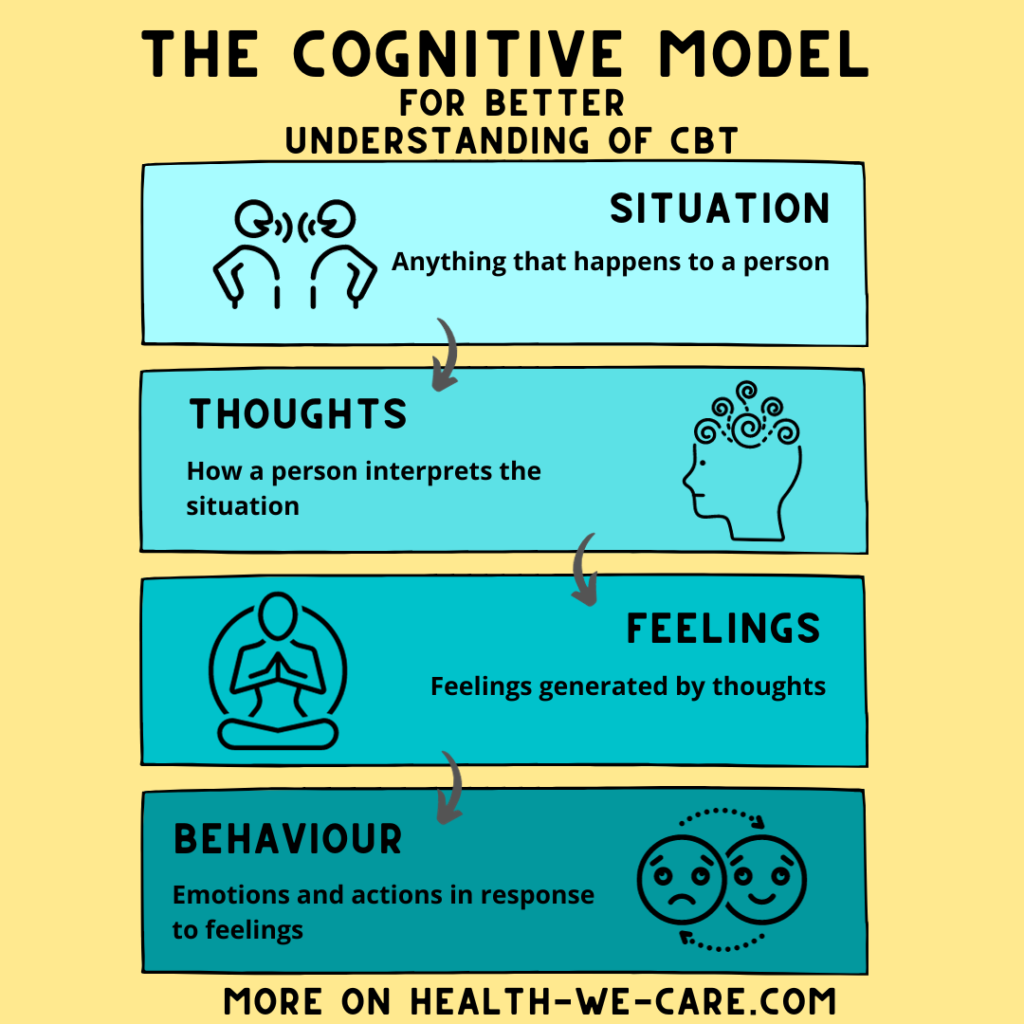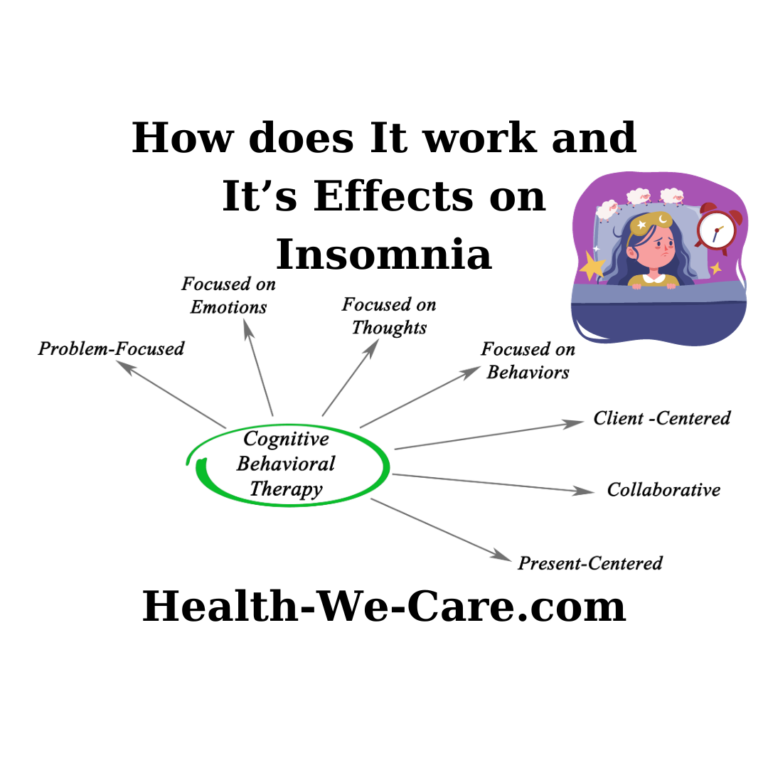Have you ever lain awake at night, wrestling with endless thoughts, seeking a respite from sleeplessness? If you’ve been searching for a scientifically backed, practical approach to improve your sleep, this post is an ideal starting point. Join us as we explore how Cognitive Behavioral Therapy can unravel the complexities of insomnia, offering not just hope, but real strategies for better sleep. We aim to answer essential questions about what CBT is, how it works, and its effectiveness for those struggling to find restorative sleep. Let’s embark on a journey to understand and harness the power of Cognitive Behavioral Therapy, and witness how it can transform your nights into peaceful slumbers.
What’s Cognitive Behavioral Therapy ?
Before we dive into the benefits and more complex topics, covering Cognitive Behavioral Therapy and it’s effects on insomnia. We need to understand the basics first. Cognitive Behavioral Therapy, we will in this article refer to it as CBT, is a form of psychotherapy that has proven it’s effectiveness on various mental health issues as anxiety, depression, and, notably, insomnia.
CBT focuses especially on the present thoughts and behaviors of a patient, aiming to identify and change negative patterns that are causing psychological distress or sleep disturbances. The principle CBT is based on is thoughts feelings and actions are well interconnected by altering identified negative thought patterns and behavior, we can change the way we feel. This principle makes CBT particularly effective to combat insomnia, as it helps individuals modify the thought processes and habits that contribute to their difficulties falling asleep. It can also be referred to as reprogramming of the mind.
Who Created Cognitive Behavioral Therapy ?
It is fairly an interesting and revolutionary story that underlines CBT’s principle of therapeutic work. CBT was developed by one of the five most influential psychotherapists of all time the American psychiatrist Dr. Aaron T. Beck in the 1960’s. While he was working on a treatment for depression, Dr. Beck was observing that most of his patients held negative views about the world, themselves and their future. He recognized maintaining and feeding these negative patterns played a significant role in depression.
For your understanding psychoanalytic approaches at this time were dominantly focused on the patient’s past experiences and subconscious. Whereas Dr. Beck’s CBT opened up a new era by focusing, identifying and changing counterproductive thought patterns and behaviors in the present. CBT’s effectiveness has led to its adaptation and expansion in treating a range of mental health issues, encompassing anxiety disorders, phobias, and insomnia.
What Cognitive Behavioral Therapy Does
We have already mentioned CBT works by identifying negative and counterproductive thoughts and behaviors, but what exactly does it and how would a therapy session look like ? First, CBT would start off by targeting negative thought patterns, that lead to negative emotions and behavior. After identifying negative patterns, CBT will try to modify the patterns that are causing problems. This can be achieved by improving emotional regulation and developing personal coping strategies as mindfulness meditation, if you want to know more about mindfulness meditation check our previous article here.
While other therapy forms often explore past experiences, CBT focuses on addressing your present challenges and devising practical solutions for them. Story time, a friend of mine let’s call her Sarah, struggled with insomnia. She would often lie around in bed worrying about the future, not getting enough rest. After a few CBT sessions, she and her therapist identified the problem and employed a mindfulness technique to keep her focused on the present. Additionally, Sarah was taught relaxation strategies to use at bedtime, creating a more helpful environment for sleep. Since then, I’ve heard no more complaints about restless nights.
This practical solution and various others help to manage emotions and thoughts more effectively. Teaching you a coping technique tailored to your specific problems is an excellent way to tackle anxiety, stress, and insomnia. If your looking to improve your nutrition you will love our tailored to you nutrition plans that will make you reach your goals, when it comes to health and fitness. Check it out here.
How Cognitive Behavioral Therapy Works
We now know CBT operates through the principle that thoughts, feelings and behavior are interconnected. The change of one part of the equation changes the others. Here is how it works. To make CBT work collaborative effort on both sides is strictly needed, the therapist and client need to work together to identify the problems and set goals for the therapy. Next, each therapy session builds open the other, attendance is important for the structural approach in CBT to work effectively.
The development of skills that tailor your issues are part of CBT, it involves learning new skills, as problem solving and cognitive restructuring, to solve every day situations, such as sleeplessness. If you think your safe from homework after leaving school, your dead wrong. CBT works with assigning homework to patients, so they can practice the developed skills outside the session.
Furthermore, one of the probably hardest aspects will be the cognitive restructuring, where you will be challenging unhelpful believes and thought patterns, with the goal to change them to the bright side. Another uneasy step is the shift from counterproductive behaviors to activities the patient finds more enjoyable or meaningful. When we take Sarah as an example again. Her pre-bedtime behavior was to start thinking about aspects in the future that seems to concern her. Therefore the shift here would be to switch to thinking about events in the future she is looking forward to, as a vacation, restaurant visit, gym class after work or just a walk in the woods.
CBT also covers relaxation and stress relief techniques, that will help manage the symptoms of stress and anxiety. One major technique is a proper breathing technique, even though you think that your breathing right your not. Luckily we have a blog post about how you can breathe properly, which will reduce the anxiety, that just appeared because of our accusation. Check it out here.
Will Cognitive Behavioral Therapy Work ?
Even though CBT is an effective treatment for a variety of psychological issues as anxiety, depression and insomnia. It’s certainly nevertheless no panacea for every individual and it’s success can vary on the following factors. Every individual is, surprisingly individual as it’s complications, problems, solutions and commitment to certain therapies. Therefore there’s always a chance that CBT might not work for you, but it’s still worth a shot. If CBT works is also dependent on the therapists effort, expertise and skill. What seems not to work at one therapist, might work with the other. It’s important to check out a few therapists before giving up on CBT as a whole.
Clearly, the nature of issue is another factor to be considered. CBT works more effective on issues dealing with depression, anxiety and insomnia, rather than personality disorders, schizophrenia or severe bipolar disorder. Positively speaking, the flexibility of the CBT is one of it’s key strengths, that range from the customizable solutions, integration with other therapies and technical adaptations, that make it available not only at in-person sessions.
When Cognitive Behavioral Therapy Doesn’t Work
As stated above there might be a chance that CBT doesn’t work for you. It won’t be the end of the world, there are other therapies available such as psychodynamic therapy, interpersonal therapy, or acceptance and commitment therapy (ACT) that might be more suitable. Furthermore, a little troubleshoot could help to find out what to do when CBT doesn’t work.
First step would be to reevaluate the treatment plan with your therapist or another therapist to see if it aligns with your needs and values. Another, on a scale from 1-10 how much do you trust your therapist ? The relationship between you and your therapist is crucial for a therapy to work. Are there any complex or chronic conditions you are not aware of ? In that case a more intense treatment might be necessary.
Self-help groups could be another good source, if you don’t know anyone that suffers from the same issues as you to gain valuable insights and other perspectives, when CBT doesn’t work. In addition, an unhealthy lifestyle without enough exercise, unbalanced diet and insufficient fresh oxygen, are indeed a negative influence for the success of any therapy. If your seeking to improve your lifestyle and meal plans check our tailored plans here.
Why Cognitive Behavioral Therapy Is Important ?
Cognitive Behavioral Therapy and its approach were milestones in psychotherapy. Introduced over 60 years ago, its results are evident, and the evidence-based approach speaks for itself. Other Therapies are mostly long term orientated, the good thing about CBT is it’s effectiveness even over a short period with a strong focus on the goals set in-session. This is succeeded by teaching self-help strategies and bringing these practical every day skills to use.
Another advantage of CBT is that it empowers individuals to take an active role in their therapy and self-improvement, granting a sense of independence that can enhance both outcomes and self-esteem. For individuals that do not want to rely on medication, CBT is a great way to reduce or even eliminate the need for medications in certain cases.
What I find particularly valuable about Cognitive Behavioral Therapy is its ability to improve coping mechanisms, leading to healthier thinking patterns and behaviors. This helps individuals effectively handle stress and anxiety in the various challenges that life presents. It also addresses the problems that trouble individuals in everyday life. Resolving these issues can significantly improve one’s quality of life.
Can Cognitive Behavioral Therapy Change Our Minds ?
To make it short, yes Cognitive Behavioral Therapy can change our minds, but how ? This can be answered by neuroplasticity, the brain’s ability to reorganize itself by forming new neural connections throughout life. You should know by now that CBT aims to change thinking patterns, behavior and feelings. These changes have, when replaced, the effect that new neural connections will be formed and the brain responds to certain stimuli and situations in a new way.
Another significant aspect is the improvement of self-awareness. CBT increases your awareness of your own thoughts, their processes, and the effects they have on your mind and body. This heightened self-awareness facilitates better emotional regulation, understanding of your thoughts and their impacts, and the interplay with emotions, thereby granting you greater control over emotional responses.
Various Questions
Is Cognitive Behavioral Therapy effective in treating insomnia ?
Yes, CBT is notably effective in treating insomnia, known specifically as CBT-I (Cognitive Behavioral Therapy for Insomnia). This specialized form targets the thoughts and behaviors that lead to chronic sleep problems. Demonstrated to enhance both the quality and duration of sleep, CBT-I is a highly recommended treatment for insomnia.
Is Cognitive Behavioral Therapy a short term treatment ?
In general, yes. CBT is structured as a short-term treatment, usually spanning a few weeks to several months. However, the precise duration varies depending on each individual’s unique needs and the specific issues at hand.
Is Cognitive Behavioral Therapy Helpful for All Types of Insomnia?
CBT-I is especially effective in treating primary insomnia, which is insomnia that isn’t linked to other health conditions. In cases where insomnia is related to medical or psychiatric conditions, CBT-I often forms part of a more comprehensive treatment plan that also addresses these underlying issues.
Can Cognitive Behavioral Therapy Change Long-standing Behavioral Patterns?
Indeed, a primary goal of CBT is to transform long-standing, unhelpful behavioral patterns and thought processes. It entails adopting new ways of thinking and behaving, making it especially effective in tackling chronic behaviors.
Is Cognitive Behavioral Therapy Suitable for Children and Adolescents?
Absolutely, CBT can be effectively tailored for children and adolescents. The approach is adjusted to align with their developmental stages and can tackle a variety of issues, including anxiety, depression, and behavioral challenges. For younger clients, CBT often involves family participation and concentrates on cultivating skills such as emotional regulation and problem-solving.
Find Your Local Cognitive Behavioral Therapy Provider
Here is a tool we recommend to find a CBT provider in your area. https://www.psychologytoday.com/us/therapists/cognitive-behavioral-cbt
We hope that if you feel you are in need of a CBT that you take it seriously and seek treatment. We appreciate you reading our article and wish you all the best. If you are interested in daily content about health and fitness you should definitely check our Instagram here. We are thrilled at the prospect of seeing you when we release our next article. Cheers!

Sources
Sleep Foundation: https://www.sleepfoundation.org/insomnia/treatment/cognitive-behavioral-therapy-insomnia
American Psychological Association: https://www.apa.org/ptsd-guideline/patients-and-families/cognitive-behavioral#:~:text=Cognitive%20behavioral%20therapy%20%28CBT%29%20is%20a%20form%20of,marital%20problems%2C%20eating%20disorders%2C%20and%20severe%20mental%20illness.
PubMed: https://pubmed.ncbi.nlm.nih.gov/32904947/
Mayo Clinic: https://www.mayoclinic.org/tests-procedures/cognitive-behavioral-therapy/about/pac-20384610
Becks Institute: https://jamanetwork.com/journals/jamapsychiatry/fullarticle/208460







